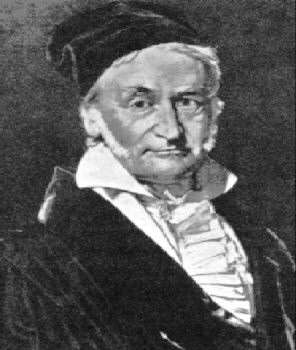
A child prodigy, Gauss taught himself to read and count by the age of three. Recognizing his talent, the Duke of Brunswick provided funding in 1792 to allow Gauss to pursue a formal education. He attended Caroline College from 1792 to 1795 at which time he formulated his famous least squares method (age of seventeen) and a conjecture on the distribution of prime numbers. This conjecture was eventually proven in 1896 by Jacques Hadamard.
In 1795, Gauss went to Göttingen where he developed the fundamental theorem of quadratic residues.
Gauss developed the concept of complex numbers and the University of Helmstedt granted him a PhD in 1799 (age of twenty-two) for his dissertation giving the first proof of the fundamental theorem of algebra. In his dissertation Gauss severely criticized Legendre, Laplace and other major contemporary mathematicians for their lack of rigor.
At the age of twenty-four, Gauss published Disquisitiones Arithmeticae, his theory of numbers. Arguably, it is one of the most brilliant achievements in the history of mathematics. The construction of regular polyhedra occur in this work as do integer congruencies and the law of quadratic reciprocity.
Gauss also calculated orbits for Ceres and Pallas. The asteroid Ceres had been briefly observed in January 1801 but then, after it had been tracked for 41 days, was lost in the brightness of the Sun. Gauss computed the orbit using his least squares method and correctly predicted when and where Ceres would reappear. Following this triumph, he accepted a position as astronomer at the Göttingen Observatory.
In 1820, Gauss invented the heliotrope, an instrument with a movable mirror to reflect the Sun's rays. It is still used in geodesy. During the late 1820s, in collaboration with the physicist Wilhelm Weber who he met while the guest of Alexander von Humboldt in Berlin, Gauss explored many areas of physics doing basic research in electricity and magnetism, mechanics, acoustics, and optics. In 1833 he constructed the first telegraph.
In his later years a fellow mathematician met him and described him as follows:
... a venerable, fine old fellow, with a contented manly expression. There is an extraordinary aspect of power about him and his every word. He is about eighty years of age, but not a trace of superannuation is seen about him.Gauss made a careful study of foreign newspapers in the reading room at Göttingen. In particular, he made a systematic study of the financial news. This enabled him to gain a considerable personal fortune through his dealings on the stock exchange.